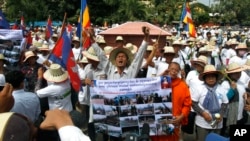More than 1,000 people marched on the National Assembly on Monday, many of them displaced from land disputes, to mark World Habitat Day.
The demonstrators took a petition to Assembly officials calling on the government to respect the rights of people for land and homes and to stop forced evictions in the name of development.
The protesters ignored warnings from Phnom Penh city officials, who had permitted them to gather in Freedom Park only. Instead, students, monks and urban and rural poor gathered near the Dey Krahorm neighborhood, which was the site of a violent eviction in 2009.
Im Sreytouch, a representative for evictees of the Beoung Kak neighborhood, addressed the crowd, along with other representatives from other communities.
“They’ll develop anything, but for the rich only,” she said. “Today, we have to make our voices heard to the prime minister and the internationals.”
The petitions were finally accepted by representatives of the Cambodian People’s Party and the opposition Cambodia National Rescue Party.
Many here expressed frustration at evictions and relocations to substandard sites.
Keo Nhor, who was evicted in a land dispute in Preah Vihear province, said she had to start a new life in “a place for ghosts.”
“We live in a forest,” she said. “It’s not human habitat. Now I’ve come to Phnom Penh and started life as a beggar. We have nothing left. Our house and our farmland were taken.”
Rights workers say evictions have lessened this year compared to previous, but many problems from prior disputes linger. An estimated 130,000 families nationwide have been forcibly evicted from their homes since development projects began in 1993, Am Sam Ath, monitoring supervisor at Licadho, said.
“The Cambodian government still does not fully respect the right to proper habitat,” he said. “The authorities still do not care about people’s rights.”







